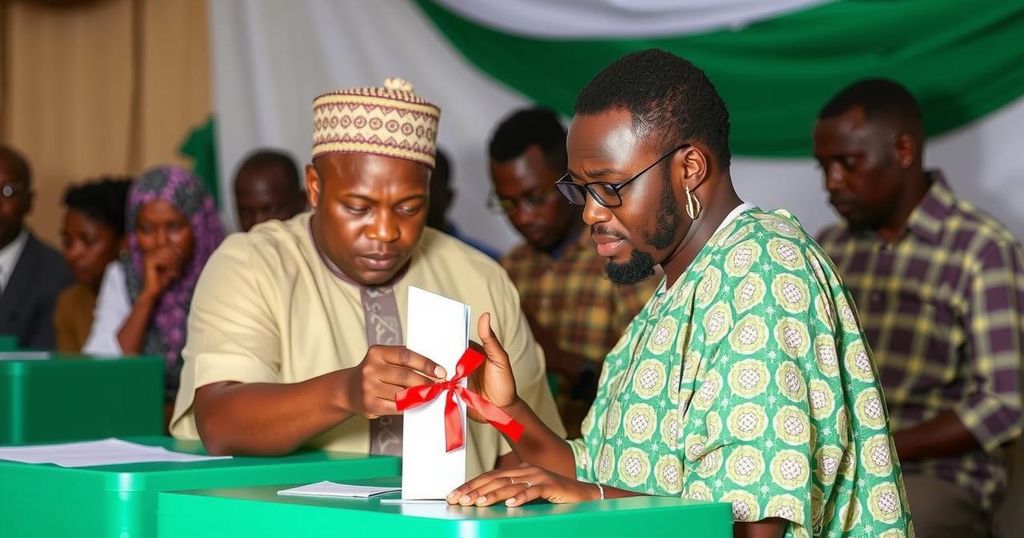John Dramani Mahama won Ghana’s 2024 presidential election, with Vice President Mahamudu Bawumia conceding defeat, highlighting Ghana’s democratic success. In contrast, Nigeria’s 2023 elections were marked by irregularities and technological failures despite a staggering budget, underscoring the need for reforms in Nigeria’s electoral processes.
In a significant demonstration of democratic principles, John Dramani Mahama, the former President of Ghana, emerged victorious in the recent presidential elections conducted over the past weekend. His successful candidacy follows the concession of defeat by his opponent, Vice President Mahamudu Bawumia, who acknowledged the will of the people during a press briefing, stating, “The people of Ghana have spoken, the people have voted for change at this time, and we respect it with all humility.” The election received widespread acclaim for its transparency and efficiency from both local and international observers.
Mahmood Yakubu, the Chairman of Nigeria’s Independent National Electoral Commission (INEC), who monitored the elections, expressed gratitude that the process had concluded successfully, noting, “We are grateful that the election has gone very well. The process and its outcome so far have been commendable.” This outcome further highlights Ghana’s established reputation as a leading exemplar of democracy within Africa. In stark contrast, Nigeria’s recent elections in 2023 have been characterized by numerous irregularities and technological issues, raising questions about the effective allocation of the N313.4 billion (approximately $215 million) spent on the electoral process.
The success of Ghana’s elections can be attributed to exceptional planning and resource management by its Electoral Commission (EC), prioritizing logistics and voter education. This resulted in a seamless electoral process, free from significant disruptions. Conversely, the INEC faced a multitude of challenges during Nigeria’s 2023 elections, despite the substantial budget allocated to it. The anticipated technological safeguards, including the Bimodal Voter Accreditation System (BVAS) and the INEC Result Viewing Portal (IReV), suffered failures at critical junctures, compounding issues such as logistical delays and allegations of electoral fraud.
Furthermore, the efficiency of Ghana’s more modest electoral budget reflects prudent financial management and effective resource allocation. In Nigeria, concerns persist about the transparency and integrity of the allocation of its election-related expenditures, with critics pointing toward inefficiencies and potential corruption as detrimental factors. A vital aspect of Ghana’s success is the significant public trust its Electoral Commission has built over years through transparency and community engagement. This has played a crucial role in fostering stability and confidence in the electoral process. In contrast, INEC faces a credibility crisis marked by allegations of incompetence, which exacerbates voter apathy and disputes over electoral outcomes.
One of the contributing factors to Ghana’s electoral success is the relative simplicity of its electoral process, which minimizes logistical complexities. Nigeria’s elections, by contrast, are often convoluted, with various tiers of elections occurring simultaneously, leading to operational challenges for INEC.
Ultimately, Ghana’s experience offers valuable insights into the imperative of effective planning, financial responsibility, and cultivation of public trust in the electoral system. For Nigeria to achieve electoral credibility, it must urgently address these systemic failings and prioritize enhancing the integrity of its democratic institutions. Should these reforms not be implemented, public trust in Nigeria’s electoral process is likely to diminish further. Despite Nigeria’s self-identification as the African giant and its sizable population, it has yet to achieve electoral standards comparable to those demonstrated by smaller nations like Ghana, which have established robust electoral frameworks that their citizens can proudly support.
“It is a shame for our electoral institutions who behave like ruling parties at states and federal levels,” remarked Don Umah, coordinator of the Nigeria Voters’ Forum. He further urged, “INEC needs to go back and ask itself questions and redeem its image.”
The article discusses the contrasting experiences of Ghana and Nigeria in their electoral processes, specifically highlighting the recent presidential elections in Ghana, which were praised for their transparency and efficiency. In juxtaposition, Nigeria’s recent elections were plagued by irregularities and technological failures, prompting a critical examination of the effectiveness and integrity of Nigeria’s electoral management. The analysis includes comments on budgetary efficiency, public trust, and the complexities of the electoral systems in both countries.
In conclusion, Ghana’s recent presidential elections serve as an exemplary model of effective democratic practices, showcasing transparency, efficient management, and public trust in electoral institutions. In contrast, Nigeria must confront substantial challenges related to electoral integrity, resource management, and public confidence in its electoral systems. Addressing these systemic issues is crucial for restoring credibility and trust in Nigeria’s democratic processes, thereby ensuring that it can emulate the successful models of its regional counterparts like Ghana.
Original Source: businessday.ng






